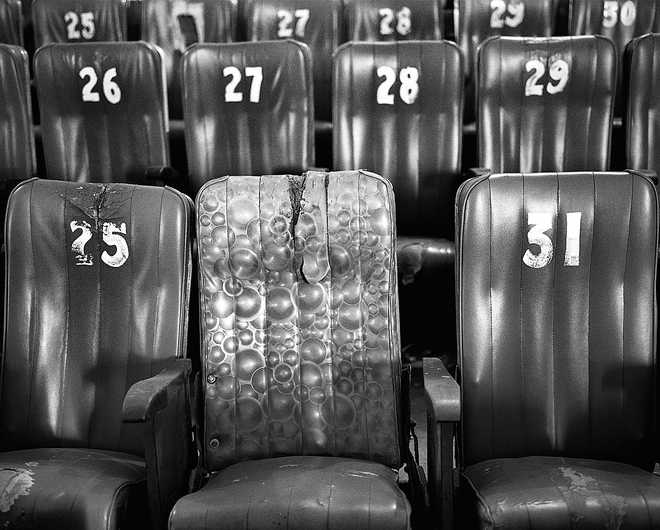
what lies forgotten: Works from Cinema Play House Untitled #5 (Natraj)
Ashima Sehajpal Batish
How do sociological and political ‘realities’ of the world fit into the frame of an artwork? Especially, when the artist’s primary subject is starkly apolitical and the social narrative has, but, only a subtle undercurrent. But ‘realities’ seep in. They do when the artist is receptive. When knowingly and unknowingly she absorbs all that’s around, on the surface and beneath it.
In photographer Nandita Raman’s case, truth overtly becomes a part of her series, Body is a Situation. In context of her body, she highlights how its language changes in tandem with the country she is in. It is different in Mexico, like it was in New York or India. “The photographs respond to how socio-cultural-political aspects of a place came into conversation with my body,” says Nandita. Memories of childhood in Varanasi, before moving to New York, came in handy. These were then juxtaposed with a visit to the hometown, this time as a visitor.
“How do I experience my body as I traverse the city full of female deities, but where women are conspicuously absent from public spaces?” The thought became a constant companion to her first New York City solo exhibition. She adds: “Even though earth is considered female, when land is bought, Vastupurusha (Vastu refers to the physical site and purusha or person refers to the Universal Man) is ordained its symbolic custodian.”
The need to reclaim our bodies gains urgency when we take into account many existing ironies. She can’t wrap her head around why the physiological process of menstruation is demonised when that is the most profound sign of procreation. To untangle the mesh, Nandita looks at the most available body, her own. “I’m very aware of my body walking through the lanes, not as much of its strength as its vulnerability, a tiresome companion. Placing feet firmly on the ground, I see I am. It situates me back into the geography.”
The artwork, she says, wasn’t a product of anger. “It was a consequence of acute observation.” She sensed that how a woman’s body behaves isn’t a result of how she wants it to, but how it has been conditioned to.
Her other series, Cinema Play House, exhibited at the George Eastman Museum, New York, received rave reviews. The work is visual documentation of the silver screens before promoters and providers of multiplexes flagged their march in the cities. Their appalling condition had an impact on her, especially because her mother’s family owned a single-screen theatre in those times. Each photograph tells the story of the disruptive present. One with seating for audience has a ripped chair, pointing to far more than is visible to the eye. Another photograph that makes nostalgia consume you is one with a cracked ticket window.
These pictures can make orderliness of multiplexes look mechanical. These lend beauty to the chaos of the old times, when there weren’t any prototypes of brick and mortar and glitzy glass structures, when chandeliers awed audience, and carpets welcomed them. The series is in shades of grey. “Any colour would have made it seductive. I was more interested in texture and space.”
She didn’t want the series to look like pictures from a glossy magazine — with upholstery in red and walls in aqua green. While most of the times, there is space for only one entity, either vanity or aesthetics, old or new — where the new is considered an automatic replacement — she hopes we find the middle ground somewhere. “I wonder why we can’t promote the repair culture. Why we can’t have the option where the old stays and new is added to it.” This, she suggests, is possible only when we don’t consider a setting as a commodity, but as a source of employment for people with families.
In her own way, she strives to stay true to the values that capitalism long back stomped on. Her tacit disapproval of everything around being corporate driven is expressed through her choice of employer. She teaches arts at Purchase College, a state-funded institution in New York. The students are from diverse economic backgrounds and often, first generation college-goers of immigrant parents. “It takes courage to opt for arts as a subject as it doesn’t promise high-flying jobs or monetary returns of technical and vocational fields”. Backing students is her way of contributing towards society.



























